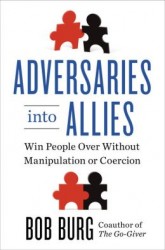“Be A Judge, Not A Lawyer”
Posted by Mitch Mitchell on Nov 27, 2013
"Be a judge, not a lawyer" - Bob Burg
Below is an interview Chris Brogan did with a guy named Bob Burg, who I'd never heard of before but I had heard of his first book The Go-Giver. It's a book that tells the story of a guy who's trying to move up in the world and learns the lesson that giving others what they want and need is a crucial part of growth, as long as you're doing it for the right reasons.
 |
In his book Adversaries Into Allies, he talks about finding ways to communicate with those who you might not really get along with by learning how to accept that they have their side, you have your position, and as long as you can acknowledge that you set the ground rules for how to communicate with each other.
The quote is powerful because when you think about it there's a lot being said. Sometimes we think of lawyers and judges as pretty much the same thing because most judges are lawyers in a position of authority.
What lawyers do is argue a position, sometimes one they don't really believe in, because that's their job, which also includes trying to get a win for their client.
What judges do is something different, especially when there's not a jury involved and it's just them having to make a decision. They listen to lawyers from both sides, look at all the evidence, and then hopefully make a fair decision based on just that and the law without putting their personal preferences into their decision. They might have a personal belief, but at that moment they realize the job they've been entrusted with and will hopefully do the right thing.
When it comes to communications, I think all we have to do is look at the United States Congress of today to realize that there's a major disconnect and a drastic change from where things were just a couple of decades ago. The two sides didn't necessarily get along all that well then either, but it turns out we really didn't see everything we thought we saw.
For instance, it turns out that most Democratic and Republican politicians back then were actually good friends, even with their different beliefs. They'd go out to dinner together or invite each other to parties. They attended many social events together. That's because they knew that when all was said and done at work they'd eventually get together and work towards getting something passed. It might not be perfect and no one would get all that they wanted, but legislation was passed, the government found its way of working, and they'd all progress to the next thing.
Moving away from politicians, sometimes it seems as though we all draw our own lines in the sand and that's pretty much that. I'm not going to say that I'm all that much better because that wouldn't be true. Instead, what I'll say is that when I'm in my home I have my beliefs that are unswayed, but if I'm in public and someone has an opposing view I will at least try to give them the time to express themselves if I can't get away from the conversation.
Sometimes I'm a lawyer and feel the need to defend something, but other times I'm the judge, where I'll let it go, come home, think about it all, and see if there was anything there that bares more thought or not. Most of the time I don't change my opinion but I do try to give it a fair thought because I have altered an opinion here and there, and that's often against people who I thought believed as I do.
As Burg says in this interview, we all have our emotions, and it's hard to control them every moment of the day. But those people who are in the best control of their emotions always end up having the upper hand, no matter what the position is. I think that's something great to look at and try to act upon.
With that said, I hope you watch and enjoy the video interview:


Another great post, Mitch. it is surprising what you can learn when you listen to someone, rather than just tell them your ideas.
Exactly Morning Li. We can know a lot already, but we learn more and thus improve by listening.